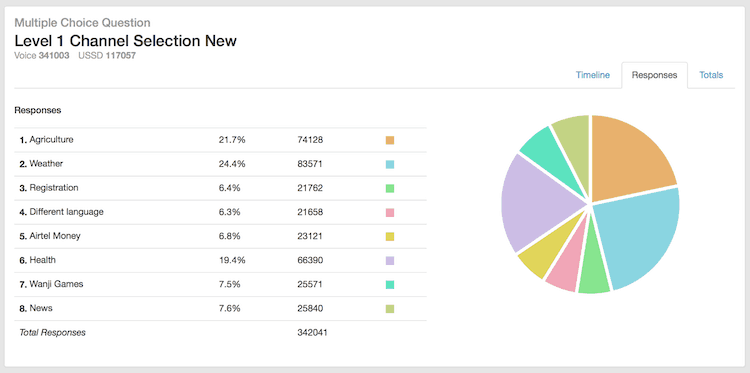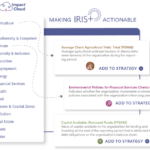No Internet? No Problem: Turning a Feature Phone Into a Digital Library Can Transform Lives
We all make decisions based on the information we have in front of us. New information can dramatically affect decisions. How do I treat a fever? Do I keep the patient warm or cold?
Like social workers, international development practitioners often try to change people’s behavior for the better by sharing new information. From health to agriculture, new information and learning can lead to new skills or behaviors and dramatically improve lives.
Without access to the internet, people rely on information from their communities. The problem with that is sometimes information is not easily accessible or immediate; sometimes there might be other options that are being missed; sometimes the information might be wrong.
If you have ever worked in a deprived community, you will quickly notice the cycle of poverty is real and often riddled with misinformation. This is why the 3-2-1 Service on simple feature phones is so important. The 3-2-1 Service is an on-demand messaging archive provided by mobile network operators (MNOs) and facilitated by HNI Voto, a social business that is dedicated to bringing the benefits of technology to individuals in the developing world. It functions like a search engine without the internet, enabling mobile phone users to request information on a topic and receive a response through text, USSD or IVR (interactive voice response).
There is a common Malagasy expression, “Mitovy zo, mitovy lanja,” which means “having the same right (as in equality), having the same weight.” Weight refers to the physical kilos of a person. A young woman named Annie who heard a gender equality message from the 3-2-1 Service said: “We were laughing when we heard from the 3-2-1 gender message that men and women have the same right, because men are almost always heavier (and therefore have more rights, according to the expression).” This emphasizes the importance of the 3-2-1 Service; it not only brings information to those who don’t have access to the internet, it also helps change community-held beliefs that need to change – such as physical weight equals rights and status.
It is no surprise that this service started as a way for development programs to get information – also known as behavior-change messages – out to project beneficiaries.
However, unlike most development programs, this service allows users to decide what they want to know and access information on demand. Jean Pierre is a 31-year-old security guard from Madagascar who stopped school after second grade and is married with two children. He uses this service most often for health information, then gender information, and also wants know more about agriculture and microcredit. He said, “One day, my baby was sick with malaria and I was able to follow the (3-2-1) messages really carefully so that I could look after my baby properly and give him the right medicine.”
In Uganda, the top topic – based on 3-2-1 search – is weather. Information provided helps farmers avoid losses and helps people plan their day. After weather, users want to know about agriculture, health, news and mobile money. Weather is an important topic in Malawi as well.

The 3-2-1 welcome menu in Uganda depicting the popularity of various themes. After their initial selection of a given theme, users pick from various topics until they find the information they need.
A GSMA (Groupe Spéciale Mobile) study found that people who use the 3-2-1 Service are likely to increase their mobile phone use. One of the reasons: People see their phone as a source of information.
There is no better endorsement of the value of this information than people’s willingness to pay for it. Users are given a certain number of 3-2-1 messages for free and then asked to pay once they pass the free quota. In development, we talk a lot about incorporating payments into services, but to be honest they often fail because in many cases people are not willing to pay. Usually, mobile network operators offer a few messages a month for free and after they are used up, users use cell phone credit to pay for extra messages. Since users are willing to pay for 3-2-1 messages, telecom companies are often willing to pay the cost of starting the 3-2-1 Service in a new country ($30,000-$50,000), helping to make this service sustainable.
We also talk a lot about sustainability – though many programs fall short of being able to operate without donor funding – and about working with mobile network operators. Even though a frequent barrier to many efforts is the fact that MNOs need to make a profit, we in development don’t speak the language of profit. This reflection came from a speech at the 2017 ICTforAg given by Maggie McDonough from Souktel, who frequently deals with development practitioners and MNOs. This can be an easy starting point to working with an MNO and assist in improving behavior change, messaging reach and sustainability.
To date, HNI Voto estimates that our telecommunications partners have donated more than 51 million airtime minutes, 44 million SMS text messages and 14 million USSD sessions with a retail value of $9.8 million. But 3-2-1, in most markets, is not a CSR initiative. Instead, telecommunications partners continue to offer the 3-2-1 Service to their subscribers independently of donor funding because, despite being free to the end user, the 3-2-1 Service benefits their bottom line.
In December 2016, GSMA found that 3-2-1 Service callers were 50 percent less likely to switch networks. 3-2-1 Service callers also reported an increased brand appreciation. GSMA even found that users of 3-2-1 have a much higher average revenue per user than the MNO user base as a whole. On average, 3-2-1 users spend three times more per month on a range of products and services. Since our telecommunications partners agree to offer the 3-2-1 Service on an ongoing basis, relatively modest investments in message creation pay off significantly, as these messages are listened to by millions of people into the foreseeable future.
Behavior-change messaging can quickly become a permanent record that scales to the national level.
International development programs can easily incorporate behavior-change messages in countries that already have 3-2-1 Service. CRS has worked with the 3-2-1 Service in Zambia, Tanzania, Nigeria, Malawi, Madagascar, Ghana and the Democratic Republic of the Congo. We believe information is powerful.
For countries that do not have 3-2-1 Service, HNI Voto needs an anchor partner in country, like development organizations, to help create menus, messages and technical expertise. While it may sound like a lot of effort, the impact of turning a feature phone into a digital library has a transformative effect. This positive externality not only changes how users engage with their phone but also how we can engage with users to improve livelihoods.
Kathryn M. Clifton is the ICT4D knowledge management and communications specialist for Catholic Relief Services.
Photo of a Kenyan farmer using a mobile phone in the field. By Neil Palmer for CIAT, via Flickr.
- Categories
- Education, Social Enterprise, Technology, Telecommunications



